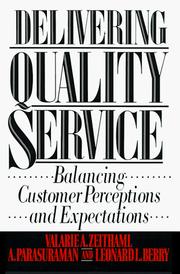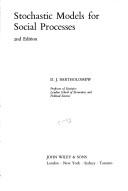| Listing 1 - 10 of 13 | << page >> |
Sort by
|
Book
ISBN: 140086707X 0691041997 9781400867073 9780691041995 Year: 1973 Publisher: Princeton, N.J. Princeton University Press
Abstract | Keywords | Export | Availability | Bookmark
 Loading...
Loading...Choose an application
- Reference Manager
- EndNote
- RefWorks (Direct export to RefWorks)
Wallace N. Atherton is concerned with a single but very important facet of the behavior of labor unions-the ways in which their bargaining objectives are determined. He begins by reviewing the existing literature and briefly sketches the conceptual structure of the union.The analysis starts with a theory whose form and substance are close to existing theories, and then is altered by adding unfamiliar elements. An eclectic "economic" model is built with two provisional assumptions: complete internal homogeneity of preferences about bargaining objectives, and perfect knowledge and foresight of everything relevant to the attainment of these objectives. The main innovation at this stage is the inclusion of anticipated strike length as a variable which affects union preferences of goals to be pursued.In Chapter IV the first provisional assumption is dropped and the model becomes "politico-economic." Allowance is made for diversity of goals within the union and for the leaderships' concern to stay in office. The theory is then restated in axiomatic terms, enabling the author to dispense with the second assumption, that of the union's perfect knowledge and foresight. The theory is now adapted to deal with a union faced with probabilities rather than certainties, and additional adaptations deal with the effect of internal threats to the leaders' control of the organization.Originally published in 1973.The Princeton Legacy Library uses the latest print-on-demand technology to again make available previously out-of-print books from the distinguished backlist of Princeton University Press. These editions preserve the original texts of these important books while presenting them in durable paperback and hardcover editions. The goal of the Princeton Legacy Library is to vastly increase access to the rich scholarly heritage found in the thousands of books published by Princeton University Press since its founding in 1905.
Collective bargaining. --- Collective bargaining--Mathematical models. --- Employment (Economic theory). --- Collective bargaining --- Business & Economics --- Labor & Workers' Economics --- Mathematical models --- Bargaining --- Labor negotiations --- -#SBIB:316.334.2A450 --- Négociation Onderhandeling --- Arbeidssociologie: syndicale strategieën: algemeen --- Mathematical models. --- Industrial relations --- Negotiation in business --- #SBIB:316.334.2A450 --- Economie Economie --- Politique Politiek --- Syndicalisme Vakbeweging --- Travail Arbeid --- Collective bargaining - Mathematical models
Book
ISBN: 9031203335 Year: 1985 Publisher: Amsterdam
Abstract | Keywords | Export | Availability | Bookmark
 Loading...
Loading...Choose an application
- Reference Manager
- EndNote
- RefWorks (Direct export to RefWorks)
Management public Overheidsmanagement --- Management (cas concrets) Concreet management --- Organisation Organisatie --- Ministères nationaux (problèmes spécifiques) Nationale ministeries (specifieke problemen) --- Hiérarchie Hiërarchie --- Organization --- Organisation --- Mathematical models --- Management

ISBN: 0029357012 9780029357019 Year: 1990 Publisher: New York Free Press
Abstract | Keywords | Export | Availability | Bookmark
 Loading...
Loading...Choose an application
- Reference Manager
- EndNote
- RefWorks (Direct export to RefWorks)
Marketing --- Customer services --- Service industries --- Quality control --- Mathematical models --- 658.81 --- 658.56 --- 659.011 --- 658.115.4 --- -#SBIB:35H511 --- #SBIB:35H201 --- #SBIB:IO --- Mathématiques Wiskunde --- Performance Prestatie --- Qualité Kwaliteitszorg --- Contrôle Controle --- Client Klant --- AA / International- internationaal --- 650 --- Industries --- Customer service --- Service, Customer --- Service (in industry) --- Services, Customer --- Technical service --- Customer relations --- Sales organization --- Quality control. Control of tool issue, materials, products etc. --- Publicity. Information work. Public relations--?.011 --- Industrie studies industriële goederen. Services and related industries --- -Mathematical models --- Kwaliteit van het openbaar bestuur --- Overheidsmanagement: technieken --- Theorieën en grondbeginselen. Management. --- Customer services. --- Mathematical models. --- 659.011 Publicity. Information work. Public relations--?.011 --- 658.56 Quality control. Control of tool issue, materials, products etc. --- 658.81 Sales organization --- #SBIB:35H511 --- Quality control&delete& --- Theorieën en grondbeginselen. Management --- Quality control. Control of tool issue, materials, products etc --- Service industries - Quality control - Mathematical models
Book
ISBN: 2842005066 9782842005061 Year: 2004 Publisher: Paris Gualino
Abstract | Keywords | Export | Availability | Bookmark
 Loading...
Loading...Choose an application
- Reference Manager
- EndNote
- RefWorks (Direct export to RefWorks)
Business enterprises --- Value analysis (Cost control) --- Entreprises --- Analyse de la valeur --- Valuation --- Evaluation --- Finances Financiën --- Entreprises Ondernemingen --- Evaluation Evaluatie --- Business enterprises - Valuation --- Business enterprises - Valuation - Mathematical models --- Business enterprises - Finance --- Évaluation financière de l'entreprise

ISBN: 0471054518 9780471054511 Year: 1973 Publisher: New York (N.Y.): Wiley
Abstract | Keywords | Export | Availability | Bookmark
 Loading...
Loading...Choose an application
- Reference Manager
- EndNote
- RefWorks (Direct export to RefWorks)
Models, Theoretical. --- Probability. --- Social Change. --- Stochastic processes --- Information (communication) Informatie (communicatie) --- Carrière Loopbaan --- Probabilités Probabiliteit --- Sciences sociales Sociale wetenschappen --- Gestion des ressources humaines Personeelsbeleid --- Random processes --- Probabilities --- Modernization --- Social Development --- Social Impact --- Change, Social --- Changes, Social --- Development, Social --- Developments, Social --- Impact, Social --- Impacts, Social --- Social Changes --- Social Developments --- Social Impacts --- Group Processes --- 519.212 --- -Social Change. --- #WWIS:IBM/STAT --- Community Development --- Development Plans --- Community Developments --- Development Plan --- Development, Community --- Developments, Community --- Plan, Development --- Plans, Development --- Abstract probability theory. Combinatorial probabilities. Geometric probabilities --- 519.212 Abstract probability theory. Combinatorial probabilities. Geometric probabilities --- Social sciences --- Models, Theoretical --- Probability --- Social Change --- Experimental Model --- Experimental Models --- Mathematical Model --- Model, Experimental --- Models (Theoretical) --- Models, Experimental --- Models, Theoretic --- Theoretical Study --- Mathematical Models --- Model (Theoretical) --- Model, Mathematical --- Model, Theoretical --- Models, Mathematical --- Studies, Theoretical --- Study, Theoretical --- Theoretical Model --- Theoretical Models --- Theoretical Studies --- Computer Simulation --- Systems Theory --- Mathematical models --- Stochastic processes. --- Mathematical models. --- Sciences sociales --- Processus stochastiques --- Modèles mathématiques --- Stochastische processen --- Social sciences - Mathematical models
Book
ISBN: 0471724653 9780471724650 Year: 1972 Publisher: London Wiley
Abstract | Keywords | Export | Availability | Bookmark
 Loading...
Loading...Choose an application
- Reference Manager
- EndNote
- RefWorks (Direct export to RefWorks)
Organization theory --- Operations research --- Decision Making --- Mathematical models --- Decision making --- Secrétariat Secretariaat --- Client Klant --- Objectifs (management) Doelstellingen (management) --- Probabilités Probabiliteit --- Prise de décision Beslissen --- Deciding --- Decision (Psychology) --- Decision analysis --- Decision processes --- Making decisions --- Management --- Management decisions --- Choice (Psychology) --- Problem solving --- Models, Mathematical --- Simulation methods --- Operational analysis --- Operational research --- Industrial engineering --- Management science --- Research --- System theory --- Decision making. --- Mathematical models. --- Operations research. --- Recherche opérationnelle --- Prise de décision --- Modèles mathématiques
Book
ISBN: 2827103680 9782827103683 Year: 1987 Volume: 35 Publisher: Fribourg Editions universitaires
Abstract | Keywords | Export | Availability | Bookmark
 Loading...
Loading...Choose an application
- Reference Manager
- EndNote
- RefWorks (Direct export to RefWorks)
Public administration --- Switzerland --- Decentralization in government --- Regionalism --- Mathematical models --- Economie Economie --- Travail Arbeid --- Science administrative Bestuurswetenschappen --- Décentralisation Decentralisatie --- Administrations non centrales Niet-centrale besturen --- Centralization in government --- Devolution in government --- Government centralization --- Government decentralization --- Government devolution --- Political science --- Central-local government relations --- Federal government --- Local government --- Human geography --- Nationalism --- Interregionalism --- Decentralization in government - Switzerland --- Decentralization in government - Europe --- Decentralization in government - Switzerland - Mathematical models --- Regionalism - Switzerland
Book
ISBN: 9027462224 Year: 1983 Publisher: Utrecht Spectrum
Abstract | Keywords | Export | Availability | Bookmark
 Loading...
Loading...Choose an application
- Reference Manager
- EndNote
- RefWorks (Direct export to RefWorks)
Management --- -Management --- -Managerial economics --- Managerial economics --- -#ECO:03.13:industrie en onderneming management --- Commerce Handel --- Gestion publique Overheidsbeheer --- Recherche opérationnelle Operationeel onderzoek --- Management (cas concrets) Concreet management --- Industrie Industrie --- kwantitatieve analyse --- management --- 65.012 --- Management : kwantitatieve methoden --- Business economics --- Economics --- Industrial management --- Microeconomics --- Administration --- Industrial relations --- Organization --- Mathematical models --- Managerial economics. --- Mathematical models. --- #ECO:03.13:industrie en onderneming management --- Social Sciences and Humanities. Management studies, Business Administration, Organizational Science -- Management Studies --- ALLW.
Book
ISBN: 2760511030 9782760511033 9781435686823 1435686829 2760516660 Year: 2004 Publisher: Sainte-Foy : Presses de l'Universite du Quebec,
Abstract | Keywords | Export | Availability | Bookmark
 Loading...
Loading...Choose an application
- Reference Manager
- EndNote
- RefWorks (Direct export to RefWorks)
Théorie des réponses aux items. --- Sciences sociales --- Tests et mesures en éducation. --- Psychométrie. --- Item response theory. --- Social sciences --- Educational tests and measurements. --- Psychometrics. --- Modèles mathématiques. --- Méthodes statistiques. --- Mathematical models. --- Statistical methods. --- Modèles Modellen --- Mesure Maat --- Evaluation Evaluatie --- Apprentissage Leerproces --- Educational tests and measurements --- Item response theory --- Psychometrics --- Measurement, Mental --- Measurement, Psychological --- Psychological measurement --- Psychological scaling --- Psychological statistics --- Psychology --- Psychometry (Psychophysics) --- Scaling, Psychological --- Psychological tests --- Scaling (Social sciences) --- Educational assessment --- Educational measurements --- Mental tests --- Tests and measurements in education --- Psychological tests for children --- Students --- Examinations --- Mathematical models --- Statistical methods --- Measurement --- Scaling --- Methodology --- Rating of
Book
ISBN: 9780141985411 Year: 2017 Publisher: London Penguin Random House
Abstract | Keywords | Export | Availability | Bookmark
 Loading...
Loading...Choose an application
- Reference Manager
- EndNote
- RefWorks (Direct export to RefWorks)
We live in the age of the algorithm. Increasingly, the decisions that affect our lives - where we go to school, whether we get a loan, how much we pay for insurance - are being made not by humans, but by mathematical models. In theory, this should lead to greater fairness: everyone is judged according to the same rules, and bias is eliminated. And yet, as Cathy O'Neil reveals in this urgent and necessary book, the opposite is true. The models being used today are opaque, unregulated, and incontestable, even when they're wrong. Most troubling, they reinforce discrimination. Tracing the arc of a person's life, O'Neil exposes the black box models that shape our future, both as individuals and as a society. These "weapons of math destruction" score teachers and students, sort CVs, grant or deny loans, evaluate workers, target voters, and monitor our health. O'Neil calls on modellers to take more responsibility for their algorithms and on policy makers to regulate their use. But in the end, it's up to us to become more savvy about the models that govern our lives. This important book empowers us to ask the tough questions, uncover the truth, and demand change.
Big data --- Mathematical models --- Algorithms --- Democracy. --- Social aspects. --- Données massives --- Indicateurs sociaux --- Démocratie --- Aspect social --- Aspect politique --- Modèles mathématiques --- Aspect moral --- Information systems --- Aspect moral. --- Mathematics --- Société Maatschappij --- Digital Digitaal --- Valeurs (société) Waarden (maatschappij) --- Citoyen Burger --- United States --- United States of America --- Technology --- Book --- Gender equality
| Listing 1 - 10 of 13 | << page >> |
Sort by
|

 Search
Search Feedback
Feedback About
About Help
Help News
News